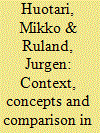| Srl | Item |
| 1 |
ID:
133783


|
|
|
|
|
| Publication |
2014.
|
| Summary/Abstract |
Debating the challenges of comparisons in Southeast Asian studies, the objective of this Special Issue is to advance the agenda of context-sensitive and methodologically reflected Comparative Area Studies (CAS). As a deliberate attempt to infuse new meaning into the embattled genre of area studies, CAS seeks to overcome increasingly rigid (sub-)disciplinary barriers often constructed around methodological arguments. Moreover, through stepping up the inclusion of non-Western regions in the research agenda, CAS also makes a decided bid to transcend the usually strongly Western-centric theory-building in most social science disciplines. This introduction locates the following articles in the broader context of the area studies-discipline divide. It highlights how the challenges of comparative research practice on different layers of social reality are at the heart of this divide but at the same time provide a productive ground for exchange in interdisciplinary Southeast Asian studies. We expand on the contributing authors' arguments by providing a typology of comparative research practice that captures the value of various forms of area studies comparisons and by reflecting on the conceptual preconditions for fruitful comparisons
|
|
|
|
|
|
|
|
|
|
|
|
|
|
|
|
| 2 |
ID:
141289


|
|
|
|
|
| Summary/Abstract |
Resilience has gained substantial traction in international politics of late. This scholarship has sparked debates concerning the meaning of resilience and how scholars should go about studying it. Scholars attuned to Michel Foucault's governmentality thesis argue that resilience is a product of contemporary neoliberalism and constitutes a strategy permitting states to abdicate responsibility in times of crisis. The overarching objective of this article is to tell a different sociopolitical story of the connections between resilience and international politics. In mapping International Relations (IR) scholars working on resilience, the gist of the argument presented here is that although resilience may be in some instances a neoliberal device for governance, it has a wider range of meanings as well. By setting out a different narrative of resilience, this article opens the possibility of an analysis that sees the emergence of resilience in international politics holding great promise for renewing and deepening current IR debates, including securitization, international interventions, vulnerability, resistance, and the political use of myth.
|
|
|
|
|
|
|
|
|
|
|
|
|
|
|
|
| 3 |
ID:
121424


|
|
|
|
|
| Publication |
2013.
|
| Summary/Abstract |
This article provides a systematic understanding of international norm emergence and illuminates the various strategic pathways to altering global dialogue and standards of practice. It traces the steps leading to global norm emergence and identifies the range of conditions that are necessary or sufficient for potential norms to move from one step to the next. Accordingly, it analyzes the progress of six separate international norm agendas to develop a more systematic understanding of the process of global norm creation, which can be applied to fledgling efforts to establish a new regime of international migrants' rights. Based on this examination, it introduces a typology that categorizes the stages of norm development and the range of possible outcomes.
|
|
|
|
|
|
|
|
|
|
|
|
|
|
|
|